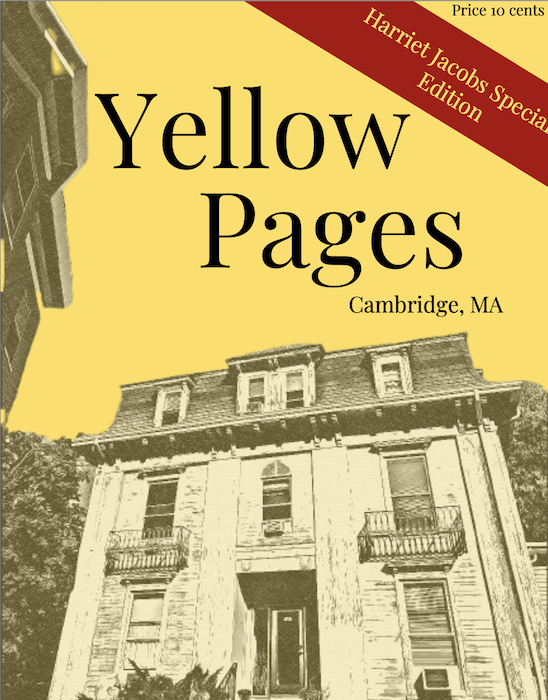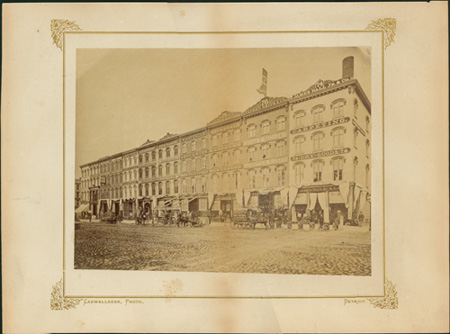Public History Projects
Abolitionist Women and Their Worlds
How does a woman become an agent of change in a historical moment when she lacks the right to vote, or even more fundamentally, lacks the right of ownership over her own person? And what is the relevance of radical women’s histories to present-day communities?
 In the spring of 2021, Tiya with teaching fellow Alyssa Napier (School of Education) set out to answer these questions and more by studying the cultural worlds of 19th century women activists engaged in major struggles to defeat chattel slavery, racial discrimination, and gender subjugation in a new public history course: Abolitionist Women and Their Worlds (History 12M). In the fall of 2024, Tiya and teaching fellow Saffron Sener (History Department) offered an updated version of this course that focused on the author and activist Harriet Jacobs and the Harriet Jacobs House in Cambridge.
In the spring of 2021, Tiya with teaching fellow Alyssa Napier (School of Education) set out to answer these questions and more by studying the cultural worlds of 19th century women activists engaged in major struggles to defeat chattel slavery, racial discrimination, and gender subjugation in a new public history course: Abolitionist Women and Their Worlds (History 12M). In the fall of 2024, Tiya and teaching fellow Saffron Sener (History Department) offered an updated version of this course that focused on the author and activist Harriet Jacobs and the Harriet Jacobs House in Cambridge.
Visit the page to see original research and creative, public oriented projects developed by students in these courses, including: a multimedia walking tour of Black women in 19th-century Cambridge and in-depth information about Harriet Jacobs’s boardinghouses and life in Massachusetts.
Working Paper on Black and Native Historical Intersections
In the fall of 2017, a diverse, majority people of color group of undergraduate students in the University of Michigan Course, “Blacks, Indians and the Making of America” took up a set of questions posed by organizers in The Majority Coalition of the Black Lives Matter Movement. The Majority is a people of color-led coalition that was initiated by the Movement for Black Lives, which includes Black Lives Matter Global Network and dozens of groups working in the 21st century Black freedom movement.
In an effort to better collaborate with indigenous organizers in a principled and informed way, The Majority reached out to scholars working on Black and indigenous issues. This paper is a response to that request.
Detroit Study Club
The Detroit Study Club emerged in the 1890s concurrent with numerous other black women’s clubs across the country but is rare due to its impressive longevity. The Detroit Study Club (originally named the Browning Club), was founded as an urban association dedicated to individual intellectual achievement and the social betterment black community. The women who founded the club were wives and daughters of economically successful black men.
The Detroit Study Club continues its outreach today by upholding traditions of educational uplift and community affirmation. The club serves as a reading and current affairs group, as well as a social support network for its members.
This essay was researched and written by first-year college students in Tiya’s course: “Images of African American Women,” University of Michigan, Winter 2018.
“There are multiple paths to the collaborations we value as historical interpreters and practitioners… And once in a blue moon, community members put forward a project that lights up our imagination.” Tiya Miles shares what inspired her to collaborate on this project with her students at the University of Michigan. Read Connecting Clues on the Trail of a Century-Old Black Women’s Club.
Learn more about the Detroit Study Club and three other African American women led clubs that changed the path of history in a recent write-up, 4 African American Women’s Clubs That Helped Write History, featured in National Trust for Historic Preservation.
Read the Detroit Study Club Essay
Slavery in Detroit

Slavery in Detroit is a public history project that seeks to explore and share a chapter of the city’s history that is rarely acknowledged. Detroit, like many towns across colonial and early America, was a place where slavery was practiced. Both African Americans and Native Americans were held as property there, and they struggled to live within the limitations of bondage. Several enslaved Detroiters attempted escape to secure freedom for themselves and their families before the War of 1812. Confronting the reality of slavery in Detroit allows us to see hidden dynamics as well as lesser known heroics in Detroit’s past.
The Slavery in Detroit project has various components that are continuing to unfold. “Mapping Slavery in Detroit” is an informational website created with a team of dedicated undergraduate and graduate students at the University of Michigan with support from the Undergraduate Research Opportunity Program at UM. The website includes reflections on a tour of Detroit taken by our team and guided by Detroiter and professional storyteller Elizabeth James. (For further reading on this topic and additional maps about black Detroit history, see our reference list on the website.)
A Michigan History magazine article, Slavery in Early Detroit, based on a public presentation made by our team at the Historical Society of Michigan Local History Conference in 2013 describes early thoughts on this research. Tiya is currently at work on a book to further explore and expand the Slavery in Detroit public history project.
Watch the video of Mapping Slavery in Detroit. The video showcases the two years of work Professor Tiya Miles and a team of students spent researching the history of slavery in pre-Civil War Detroit, mapping the lives of slaves and former slaves and reclaiming an essential part of the city’s history.
The Fall 2014 issue of LSA Magazine featured a write-up of Mapping Slavery in Detroit written by Brian Short. Read the full article.
Vann House Public History Project
The Chief Vann House, operated by the Georgia Department of Natural Resources, offers a rare opportunity for the exploration of African American life among American Indians. James Vann was a wealthy Cherokee who built a plantation called Diamond Hill in present-day north Georgia. Vann and his family possessed nearly 100 of the 583 black slaves owned by Cherokees in the first decade of the nineteenth century. The Vann home has been restored and is open to the public for guided tours and events.
Read the Vann House Public History Project
Margaret Ann Crutchfield Memoir
The House on Diamond Hill: A Cherokee Plantation Story contains a transcription of the religious memoir of Peggy Scott Vann (also known as Margaret Ann Crutchfield), mistress of the Diamond Hill plantation and wife of James Vann. As the first convert to the Moravian faith in the Cherokee nation, Peggy should have written, or had written for her, a religious biography called a “Memoir.” However, archivists expected that a memoir had never existed for Peggy Vann because no such text had been found. A copy of the original text has now surfaced.
Read More About the Crutchfield Memoir
Laura Smith Haviland, Michigan Abolitionist
The Underground Railroad (UGRR) in Michigan has become a topic of increasing public interest during this sesquicentennial anniversary of the Civil War. While on sabbatical in 2010-11, I had the opportunity to engage in local research on the topic. I became especially interested in the biography of the daring abolitionist, Laura Smith Haviland, whom historian Catherine Clinton has compared to Harriet Tubman.
Laura Smith Haviland was inducted into the 2018 Hall of Fame class at the National Abolition Hall of Fame in Peterboro, NY. The main event was October 22, 2018 in Peterboro, New York. More information on the National Abolition Hall of Fame.
Tiya discussed the heroic role Laura Smith Haviland played in the anti-slavery movement in Michigan and the Midwest on a recent segment on Michigan Public Radio. Listen to the interview.